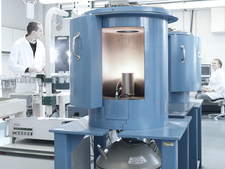-
Topics
subnavigation
Topics
Electromagnetic fields
- What are electromagnetic fields?
- Static and low-frequency fields
- Radiation protection relating to the expansion of the national grid
- High-frequency fields
- Radiation protection in mobile communication
Optical radiation
Ionising radiation
- What is ionising radiation?
- Radioactivity in the environment
- Applications in medicine
- Applications in daily life and in technology
- Effects
- What are the effects of radiation?
- Effects of selected radioactive materials
- Consequences of a radiation accident
- Cancer and leukaemia
- Genetic radiation effects
- Individual radiosensitivity
- Epidemiology of radiation-induced diseases
- Ionising radiation: positive effects?
- Risk estimation and assessment
- Radiation protection
- Nuclear accident management
- Service offers
-
The BfS
subnavigation
The BfS
- About us
- Science and research
- Laws and regulations
- BfS Topics in the Bundestag
- Links
Coordinating Office for issues relating to the monitoring of environmental radioactivity in case of enhanced natural radioactivity (ENORM)
The Coordinating Office for questions of radioactivity monitoring in the event of enhanced natural radioactivity (Coordinating Office ENORM) was established in 2002. For methodical-analytical works various laboratories are available at the Berlin site such as
- sample preparation centre,
- gamma spectrometry laboratory,
- radon calibration laboratory and
- service centre dosimetry.
Coordinating Office ENORM
Natural radionuclides are ubiquitously in small quantities and contribute to environmental radioactivity. Due to various geological conditions as well as extraction and processing of commodities (ore, oil, natural gas, building materials etc.), an enhancement of these nuclides is possible at working places and in the environment.
As part of the nationwide monitoring of the environmental radioactivity, the legislative authority established the Coordinating Office for questions of radioactivity monitoring in the event of enhanced natural radioactivity (Coordinating Office ENORM) of Federal Office for Radiation Protection (BfS) in 2002. Various laboratories for methodical-analytical works are available at the Berlin site.
Sample preparation centre
At the sample preparation centre, the incoming materials are initially documented in a data base.
Among others, the following is treated:
- Soils and sediments,
- Food and feed,
- Drinking water and groundwater,
- Surface water, seepage and waste water,
- Sludge, deposits, dusts and similar materials from the industry as well as
- building materials.
The materials are treated in compliance with the requirements of the following measurement methods. They are, e.g., dried, sifted, crushed, incinerated, and/or aliquoted, i.e. portioned and split into the amounts to be examined.
The centre is especially equipped for the treatment of samples that are subsequently examined with the help of gamma spectrometric analyses.
Gamma spectrometry laboratory

![]() High-purity germanium detector with automatic sample changer
High-purity germanium detector with automatic sample changer
In the gamma spectrometry laboratory, the gamma radiation emitted by the materials being treated is measured with the help of high-resolution germanium detectors. The laboratory equipment and the measurement technology are designed such that it is possible to detect even very low activities of natural radionuclides (low radioactivity) (low-level-measurement laboratory).
The analysis of the measured radiation makes it possible to clearly identify the radionuclides contained in the sample material (gamma emitters) and to determine their respective specific activities.
Radon calibrating laboratory
To ensure the quality of devices measuring radon and radon decay products, the Federal Office for Radiation Protection (BfS) maintains an accredited calibration service laboratory for the measurands
- activity concentration of radon-222 in air and
- potential alpha-energy concentration of short-lived radon-222 progenies.
The calibration of the measuring devices is traced back to standards provided by the Physikalisch-Technische Bundesanstalt (PTB), so-called national primary standards.
Accreditation is granted by the German Accreditation Body.
Service centre dosimetry
Radiation protection measuring devices, especially for the measuring of gamma dose rate, are used to determine the radiation dose in many different spheres of life. Reliable and verifiable measurements can only be granted if function and calibration are examined on a regular basis. This is done by the service centre dosimetry at the Berlin site.
The examinations carried out serve internal quality assurance purposes and do not replace calibration of the devices according to the German Weights and Measures Act. The devices used by the BfS are calibrated on a regular basis and in compliance with the provisions for official measurements.
State of 2018.02.01


